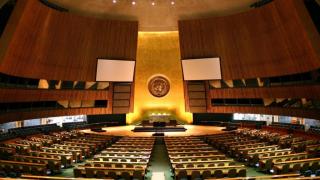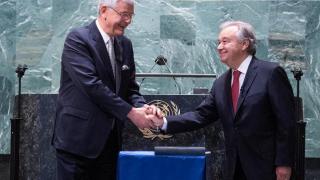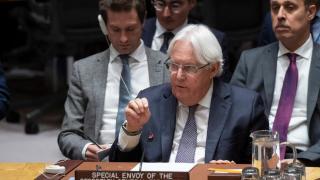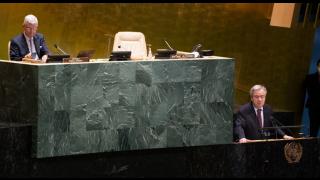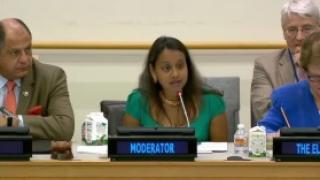
On Saturday 26 September at a packed UN meeting moderated by UNA-UK's Executive Director, Natalie Samarasinghe, a host of countries, prominent individuals and civil society spoke up in favour not only of urgent action to implement landmark General Assembly Resolution 69/321, but also of striving for further improvements to the process to select the next UN Secretary-General.
Hosted jointly by the Accountability, Coherence and Transparency (ACT) group of states and The Elders, the panel comprised the President of Costa Rica, Luis Guillermo Solís-Rivera, Estonia’s Minister for Foreign Affairs, Marina Kaljurand, Finland’s Permanent Representative to the UN, Kai Sauer, and two members of The Elders: former Prime Minister of Norway, Gro Harlem Brundtland, and former President of Mexico, Ernesto Zedillo.
As co-founder of 1 for 7 Billion, which campaigns for a fairer, more inclusive process to select the UN Secretary-General, UNA-UK's Natalie Samarasinghe moderated the discussion.
During the debate, two themes emerged: wide support for a single, non-renewable term of office, and discussions about the qualities required to be Secretary-General.
Support for a single term was backed in the opening speeches from President Solís-Rivera, Marina Kaljurand and Gro Harlem Brundtland, as well as by a raft of member states during the discussion. However, the UK, which has supported other reform proposals, was out of step with the international community when its Deputy Permanent Representative raised concerns that a single term for the next Secretary-General could result in a ‘lame duck’ post-holder.
Many member states outlined the qualities necessary for a Secretary-General to be an effective leader. In a powerful statement, President Solís-Rivera of Costa Rica cited independence as a key requirement for the post-holder, suggesting that the term of office be changed to a single, seven-year term to ensure the next UN leader is focused on global concerns, rather than "campaigning, re-election favoritisms and undue promises".
Brazil's ambassador added that hearings between candidates and member states, as agreed upon in the recent “transformative” General Assembly resolution, would enable the wider UN membership to identify leading candidates.
In an early exchange between the UK and Spain, who hold the presidencies of the Security Council in October and November respectively, it was made clear that work is underway to advance the joint letter to outline the appointment process from the Presidents of the Security Council and the General Assembly, agreed to in the resolution.
In her opening remarks, Natalie Samarasinghe praised the work of ACT and the Ad-Hoc Working Group in bringing about the resolution, but warned against complacency regarding its implementation:
“The job is not yet done. We are still a long way from having a fair, open and inclusive process. The resolution has to be implemented and steps need to be taken this autumn to make sure there is enough time for a proper process.”
During the event, several states took the opportunity to specifically highlight 1 for 7 Billion’s role in increasing momentum on this issue and galvanising member states' and civil society’s support for a process that will deliver the best possible candidate.
1 for 7 Billion looks forward to the swift implementation of Resolution 69/321 and will continue to push for wider reforms to the process including civil society and media engagement, vetting of candidates, consideration of a single term and an end to the backroom deals that see high-level UN jobs being divvied up between powerful countries in return for supporting candidates.
Click here to watch the event on UN Web TV
Click here for a full list of 1 for 7 Billion’s reform proposal


